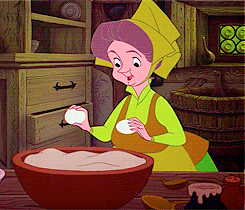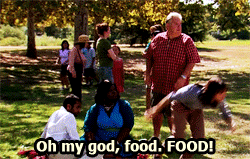Thanksgiving becomes a bit more complex to celebrate when you are a feminist. What may have started out as a holiday that involved tracing your hand to draw a turkey and getting a couple days off school is now a day you recognize as a day of mourning for Native Americans, and rightfully so. After all, the Thanksgiving we grow up with in our country is basically an oversimplified, white-washed version of what is really one chapter of the genocide of the indigenous people of the Americas. Pumpkin pie and expressions of gratitude go down easy on any day of the year, but the part of our American history attached to Thanksgiving isn't exactly easy to swallow.
Unsurprisingly, there is a lot of whiteness when it comes to the traditional Thanksgiving meal (refer to this piece examining why white meat is often preferred over dark meat turkey, or this history on white people and pumpkins, and you’ll see what I mean). And then, of course, Thanksgiving celebrations can come loaded with what I can only refer to as “patriarchal traditions.” Who hasn’t attended a Thanksgiving dinner only to see the women of the group cook, serve, and clean up while the men sit back and watch sports? Growing up, I recall my mother handing off napkins and silverware for me to deliver to the table, and yet my able-bodied, older brother was rarely asked to participate in serving anything.
As I grew up and started to understand both more about the problematic aspects of this holiday, and about what they meant in the context of my feminist identity, I was presented with an interesting challenge: How do I continue to enjoy a tradition (and food, dear god, the food) I feel sentimentally attached to and don't want to let go of, while reconciling how insurmountably offensive so many parts of it are? It turns out, there's an answer to this.
This Thanksgiving, I thought I would share some ways in which we can all make our holiday a bit more feminist, because it’s about damn time:
Learn About The True (And Complex) History Of Thanksgiving And Share This Information With Others
While I have known for decades now that the Pilgrims weren’t exactly a group of peace-loving people that came to share the land of the Native Americans, it wasn’t until recently that I began researching the history of the Wampanoag people and their involvement in the supposed “First Thanksgiving” (That’s a false statement, by the way, since there were many Thanksgiving-type feasts after every harvest. Learning about the myths of Thanksgiving is so captivating and illuminating, and is a totally worthwhile thing to do when you're tired of talking to your relatives before dinner.) It’s up to us to seek out alternative narratives and teach them to our children and to others who may not hear them otherwise.
...While Also Committing Yourself To Being A Good Ally
There are plenty of ways you can learn about and even help improve the current situation of the remaining Wampanoag tribe and other indigenous people: Write to Congress to support the return of state and federal lands back to their rightful tribes; Support your local tribes by visiting their museums, purchasing their goods, or even attending a local pow wow; Lobby to remove racist symbols as sports team mascots; Watch more films and read more books written by native people. And most specifically to this day, use Thanksgiving as an annual marker in your new life as an ally and be thankful each year for all the positive work you have done that year. And maybe only buy, like, 4 pies instead of 5 this year, and donate to non-profit organizations that support Native Americans.
Find Positive Ways To Discuss Race (And Gender, Sexual Orientation, Etc.) At The Table
It seems like the day after Thanksgiving, I always end up hearing about the awful, bigoted things friends’ (usually older) family members said at the dinner table. In fact, I know I’ve probably heard (and since blocked out) inappropriate things from my own family. Rather than wait for someone to blurt out something horrifically ignorant, take this time to start a real dialogue about the problems facing minorities today. This year’s topics could include the importance of the #blacklivesmatters movement (and the onslaught of police brutality against blacks and other minorities), the work that needs to continue even after the passing of marriage equality, and the need for immigration reform to help improve the struggle of undocumented immigrants (as well as the potential future influx of Syrian refugees in need). And if things do end up getting heated, here’s a handy guide on how to argue for any of these causes and then some.
Make Sure Everyone Feels Safe And Welcome
While positive dialogue is encouraged at this time, one thing a feminist Thanksgiving should be free of is bigotry and threats. If someone at your table makes, say, transphobic comments or should someone make another feel uncomfortable in any way (perhaps a drunk relative make a pass at one of your guests), nip it in the bud immediately. And if the problem isn’t fixed, you can always show them the door. A feminist Thanksgiving is about making everyone feel safe and included.
Always Refer To Folks By Their Actual Pronouns
If you are hosting a dinner, then you likely know everyone who is coming over and will probably know what pronouns they go by. But if you don’t (or if you’re attending someone else’s dinner), try not to make assumptions. This is an incredibly simple way of making sure no guest feels uncomfortable. Try to enlighten the other guests on this easy tactic as well.
Abolish The Division Of Labor By Gender

While many households may find themselves equal in the chores department throughout the rest of the year, it seems that quite often women do the bulk of the work on Thanksgiving. It’s like the holiday is a pass to be sexist again, in the name of “tradition.” Of course, we know this is bullshit so feel free to ask everyone to help out this year. And if your mother keeps only asking you to help arrange the table, quickly pass the task along to your male cousin or uncle or father, even if they are watching the game and it’s in the 4th quarter. Deal with it.
Be Inclusive In Your Food Spread

Just because there are “traditional Thanksgiving foods” doesn’t mean you have to only eat cranberry sauce and green bean casserole every year. See if you can diversify your menu a bit. Or if you’re going to someone else’s house for the day, try to bring something representative of your own culture. You could also attempt to eat what was eaten by the Native Americans during the “first” Thanksgiving. And don’t forget to ask friends and family about food preferences and allergies. As a longtime vegetarian, this simply question means so much and avoid keeping folks like me starving by the end of the night.
Don't Make Excuses For How Much Food You Eat
Or feel guilty about how much food you eat, or generally engage in anything associated with self-body-shaming. There's this weird standard imposed on women where we're supposed to be "cool" enough to eat a sh*t-ton of food when "appropriate" while maintaining a body that doesn't show an extra pound of fat, and Thanksgiving is a day when this rears it's horrible head especially high.
The fact is, woman struggle with eating disorders and body image issues far more than men, and Thanksgiving — a holiday largely centered around the consumption of lots o' food, eating in front of many people — can be a massively triggering day for so many people. This is kinda the one day of the year where not eating a lot of food is seen as something to be embarrassed by. There's typically very little consideration for the fact that a lot of women have a very hard time going buckwild on the pie table because they're shamed for their bodies and eating habits on every other day of the year (and then, of course, they're called out and questioned on Thanksgiving if they don't gorge themselves).
All of this messy stuff considered, not only can you strive to not make apologies for your food consumption or your body on Thanksgiving, but to make your dinner a safe, shame-free place for everyone, no matter how much they eat, or what they eat.
And Maybe Even Serve The Women Just A Little More Food Than The Men This Year

You know, to make up for the whole lack of equal pay thing. Seriously, though, I want that last scoop of stuffing.
Images: vxla/Flickr; oceanstater/Flickr; fibonacciblue/Flickr; Wifflegif; Giphy(6)
